Cardiff (UK Parliament constituency)
Cardiff was a parliamentary constituency centred on the town of Cardiff in South Wales which returned one Member of Parliament to the House of Commons from 1542 until it was abolished for the 1918 general election.
| Cardiff | |
|---|---|
| Former Borough constituency for the House of Commons | |
| 1542–1918 | |
| Number of members | one |
| Replaced by | Cardiff Central, Cardiff East and Cardiff South |
Boundaries
Under the Laws in Wales Acts 1535 and 1542, most Welsh shire towns returned one MP, including Cardiff as the shire town of Glamorgan; however, other ancient boroughs in the shire contributed to the expense of the borough MP and in return gained a share in the vote.[1] In the case of Cardiff, the relevant "contributory boroughs" were Llantrisant and Cowbridge, and until 1832 also Swansea, Loughor, Neath, Aberavon, and Kenfig.[2] Elections were often held at Bridgend, which was not a contributory borough but was conveniently central in Glamorgan.[3] The Reform Act 1832 separated the contributory boroughs other than Llantrisant and Cowbridge into the new Swansea District of Boroughs. As proposed in 1830, the reform bill would have added Llandaff, Aberdare, and Merthyr Tydfil as Cardiff contributory boroughs, but in the event Merthyr and Aberdare became a separate borough while Llandaff remained part of Glamorgan county constituency, which gained a second seat.[4] The Parliamentary Boundaries Act 1832 extended the boundary of the Cardiff District of Boroughs constituency to include those parts of the Cardiff parishes of St Mary's and St. John outside the old borough boundary.[5] The Redistribution of Seats Act 1885 extended the parliamentary boundary to Cardiff's enlarged municipal borough boundary.[6]
Members of Parliament
MPs 1542–1645
| Parliament | Member |
|---|---|
| 1542 | John Bassett |
| 1545 | Unknown |
| 1547 | John Cock, sat for Calne, repl. by Sir Philip Hoby |
| 1553 (Mar) | ?David Evans |
| 1553 (Oct) | David Evans |
| 1554 (Apr) | David Evans |
| 1554 (Nov) | William Colchester |
| 1555 | William Herbert |
| 1558 | Lleisan Pryce |
| 1559 | David Evans |
| 1562/3 | Henry Lewes |
| 1571 | Henry Morgan |
| 1572 | David Roberts |
| 1584 | Nicholas Herbert |
| 1586 | George Lewis |
| 1588 | Gabriel Lewys |
| 1593 | David Roberts |
| 1597 | Nicholas Hawkins |
| 1601 | William Lewis |
| 1604 | Matthew Davies |
| 1614 | Matthew Davies |
| 1621 | William Herbert |
| 1624 | William Price |
| 1625 | William Price |
| 1626 | William Price |
| 1628 | Lewis Morgan |
| 1629–1640 | No Parliaments summoned |
| 1640 | William Herbert killed at Battle of Edgehill 1642 |
| 1642–1645 | Not represented |
MPs 1645–1832
MPs 1832–1918
| Election | Member | Party | |
|---|---|---|---|
| 1832 | John Iltyd Nicholl | Conservative | |
| 1852 | Walter Coffin | Radical[8][9][10] | |
| 1857 | James Crichton-Stuart | Whig[11] | |
| 1859 | Liberal | ||
| 1880 | Sir Edward Reed | Liberal | |
| 1895 | James Mackenzie Maclean | Unionist | |
| 1900 | Sir Edward Reed | Liberal | |
| 1904 | Liberal Unionist | ||
| 1906 | Ivor Guest | Liberal | |
| 1910 (Jan) | D. A. Thomas | Liberal | |
| 1910 (Dec) | Lord Ninian Crichton-Stuart | Unionist | |
| 1915 by-election | Sir James Cory, 1st Baronet | Conservative | |
| 1918 | constituency abolished: see Cardiff Central, Cardiff East and Cardiff South | ||
Election results
Elections in the 1830s
| Party | Candidate | Votes | % | ||
|---|---|---|---|---|---|
| Whig | Patrick Crichton-Stuart | Unopposed | |||
| Whig hold | |||||
| Party | Candidate | Votes | % | ||
|---|---|---|---|---|---|
| Whig | Patrick Crichton-Stuart | Unopposed | |||
| Whig hold | |||||
| Party | Candidate | Votes | % | ||
|---|---|---|---|---|---|
| Tory | John Iltyd Nicholl | 342 | 64.2 | ||
| Whig | Patrick Crichton-Stuart | 191 | 35.8 | ||
| Majority | 151 | 28.4 | |||
| Turnout | 533 | 77.6 | |||
| Registered electors | 687 | ||||
| Tory gain from Whig | |||||
| Party | Candidate | Votes | % | ||
|---|---|---|---|---|---|
| Conservative | John Iltyd Nicholl | Unopposed | |||
| Registered electors | 672 | ||||
| Conservative hold | |||||
Nicholl was appointed as a Lord Commissioner of the Treasury, causing a by-election.
| Party | Candidate | Votes | % | ||
|---|---|---|---|---|---|
| Conservative | John Iltyd Nicholl | Unopposed | |||
| Conservative hold | |||||
| Party | Candidate | Votes | % | ||
|---|---|---|---|---|---|
| Conservative | John Iltyd Nicholl | Unopposed | |||
| Registered electors | 635 | ||||
| Conservative hold | |||||
Elections in the 1840s
| Party | Candidate | Votes | % | ± | |
|---|---|---|---|---|---|
| Conservative | John Iltyd Nicholl | Unopposed | |||
| Registered electors | 765 | ||||
| Conservative hold | |||||
Nicholl was appointed Judge Advocate General of the Armed Forces, requiring a by-election.
| Party | Candidate | Votes | % | ± | |
|---|---|---|---|---|---|
| Conservative | John Iltyd Nicholl | Unopposed | |||
| Conservative hold | |||||
| Party | Candidate | Votes | % | ± | |
|---|---|---|---|---|---|
| Conservative | John Iltyd Nicholl | Unopposed | |||
| Registered electors | 797 | ||||
| Conservative hold | |||||
Elections in the 1850s
| Party | Candidate | Votes | % | ± | |
|---|---|---|---|---|---|
| Radical | Walter Coffin | 490 | 51.4 | New | |
| Conservative | John Iltyd Nicholl | 464 | 48.6 | N/A | |
| Majority | 26 | 2.8 | N/A | ||
| Turnout | 954 | 98.6 | N/A | ||
| Registered electors | 2,072 | ||||
| Radical gain from Conservative | Swing | N/A | |||
| Party | Candidate | Votes | % | ± | |
|---|---|---|---|---|---|
| Whig | James Crichton-Stuart | Unopposed | |||
| Registered electors | 1,640 | ||||
| Whig gain from Radical | |||||
| Party | Candidate | Votes | % | ± | |
|---|---|---|---|---|---|
| Liberal | James Crichton-Stuart | Unopposed | |||
| Registered electors | 1,793 | ||||
| Liberal hold | |||||
Elections in the 1860s
| Party | Candidate | Votes | % | ± | |
|---|---|---|---|---|---|
| Liberal | James Crichton-Stuart | Unopposed | |||
| Registered electors | 2,072 | ||||
| Liberal hold | |||||
| Party | Candidate | Votes | % | ± | |
|---|---|---|---|---|---|
| Liberal | James Crichton-Stuart | 2,501 | 54.9 | N/A | |
| Conservative | Hardinge Giffard | 2,055 | 45.1 | New | |
| Majority | 446 | 9.8 | N/A | ||
| Turnout | 4,556 | 84.6 | N/A | ||
| Registered electors | 5,388 | ||||
| Liberal hold | Swing | N/A | |||
Elections in the 1870s
| Party | Candidate | Votes | % | ± | |
|---|---|---|---|---|---|
| Liberal | James Crichton-Stuart | 2,780 | 50.1 | −4.8 | |
| Conservative | Hardinge Giffard | 2,771 | 49.9 | +4.8 | |
| Majority | 9 | 0.2 | −9.6 | ||
| Turnout | 5,551 | 83.4 | −1.2 | ||
| Registered electors | 6,656 | ||||
| Liberal hold | Swing | −4.8 | |||
Elections in the 1880s
| Party | Candidate | Votes | % | ± | |
|---|---|---|---|---|---|
| Liberal | Edward Reed | 3,831 | 53.1 | +3.0 | |
| Conservative | Arthur Guest | 3,383 | 46.9 | −3.0 | |
| Majority | 448 | 6.2 | +6.0 | ||
| Turnout | 7,214 | 86.4 | +3.0 | ||
| Registered electors | 8,350 | ||||
| Liberal hold | Swing | +3.0 | |||
| Party | Candidate | Votes | % | ± | |
|---|---|---|---|---|---|
| Liberal | Edward Reed | 5,569 | 50.6 | −2.5 | |
| Conservative | Henry Harben | 5,429 | 49.4 | +2.5 | |
| Majority | 140 | 1.2 | −5.0 | ||
| Turnout | 10,998 | 87.3 | +0.9 | ||
| Registered electors | 12,605 | ||||
| Liberal hold | Swing | −2.5 | |||
Reed was appointed a Lord Commissioner of the Treasury, requiring a by-election.
| Party | Candidate | Votes | % | ± | |
|---|---|---|---|---|---|
| Liberal | Edward Reed | 5,708 | 54.1 | +3.5 | |
| Conservative | John Dillwyn-Llewelyn | 4,845 | 45.9 | -3.5 | |
| Majority | 863 | 8.2 | +7.0 | ||
| Turnout | 10,553 | 83.7 | -3.6 | ||
| Registered electors | 12,605 | ||||
| Liberal hold | Swing | +3.5 | |||
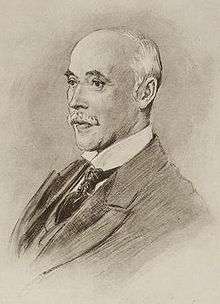
| Party | Candidate | Votes | % | ± | |
|---|---|---|---|---|---|
| Liberal | Edward Reed | 5,307 | 51.7 | +1.1 | |
| Liberal Unionist | Henry Brand | 4,965 | 48.3 | −1.1 | |
| Majority | 342 | 3.4 | +2.2 | ||
| Turnout | 10,272 | 81.5 | −5.8 | ||
| Registered electors | 12,605 | ||||
| Liberal hold | Swing | +1.1 | |||
Elections in the 1890s
| Party | Candidate | Votes | % | ± | |
|---|---|---|---|---|---|
| Liberal | Edward Reed | 7,226 | 52.5 | +0.8 | |
| Liberal Unionist | John Gunn | 6,540 | 47.5 | -0.8 | |
| Majority | 686 | 5.0 | +1.6 | ||
| Turnout | 13,766 | 81.5 | 0.0 | ||
| Registered electors | 16,886 | ||||
| Liberal hold | Swing | +0.8 | |||
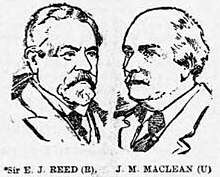
| Party | Candidate | Votes | % | ± | |
|---|---|---|---|---|---|
| Conservative | James Mackenzie Maclean | 8,386 | 52.6 | +5.1 | |
| Liberal | Edward Reed | 7,562 | 47.4 | -5.1 | |
| Majority | 824 | 5.2 | N/A | ||
| Turnout | 15,948 | 82.4 | +0.9 | ||
| Registered electors | 19,358 | ||||
| Conservative gain from Liberal | Swing | +5.1 | |||
Elections in the 1900s
| Party | Candidate | Votes | % | ± | |
|---|---|---|---|---|---|
| Liberal | Edward Reed | 9,342 | 52.2 | +4.8 | |
| Conservative | Joseph Lawrence | 8,541 | 47.8 | −4.8 | |
| Majority | 801 | 4.4 | N/A | ||
| Turnout | 17,883 | 80.0 | -2.4 | ||
| Registered electors | 22,361 | ||||
| Liberal gain from Conservative | Swing | +4.8 | |||
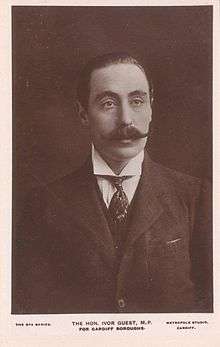
| Party | Candidate | Votes | % | ± | |
|---|---|---|---|---|---|
| Liberal | Ivor Guest | 12,434 | 56.9 | +4.7 | |
| Conservative | James Fortescue-Flannery | 9,429 | 43.1 | −4.7 | |
| Majority | 3,005 | 13.8 | +9.4 | ||
| Turnout | 21,863 | 80.8 | +0.8 | ||
| Registered electors | 27,057 | ||||
| Liberal hold | Swing | +4.7 | |||
Elections in the 1910s
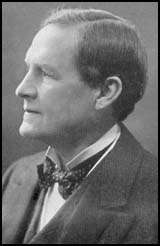
| Party | Candidate | Votes | % | ± | |
|---|---|---|---|---|---|
| Liberal | D. A. Thomas | 13,207 | 53.1 | -3.8 | |
| Conservative | Ninian Crichton-Stuart | 11,652 | 46.9 | +3.8 | |
| Majority | 1,555 | 6.2 | -7.6 | ||
| Turnout | 24,859 | 86.5 | +5.7 | ||
| Liberal hold | Swing | -3.8 | |||
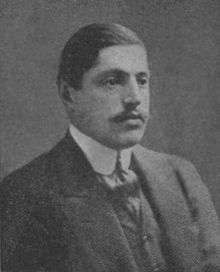
| Party | Candidate | Votes | % | ± | |
|---|---|---|---|---|---|
| Conservative | Ninian Crichton-Stuart | 12,181 | 50.6 | +3.7 | |
| Liberal | Clarendon Hyde | 11,882 | 49.4 | -3.7 | |
| Majority | 299 | 1.2 | N/A | ||
| Turnout | 24,068 | 83.8 | -2.7 | ||
| Conservative gain from Liberal | Swing | +3.7 | |||
| Party | Candidate | Votes | % | ± | |
|---|---|---|---|---|---|
| Unionist | James Cory | Unopposed | |||
| Unionist hold | |||||
References
- "Constituencies 1509–1558". History of Parliament Online. Retrieved 29 July 2019.
- Fuidge, N. M. "Cardiff Boroughs 1509–1558". History of Parliament Online. Retrieved 29 July 2019.
- Bowen, Lloyd; Healy, Simon. "Cardiff Boroughs 1604–1629". History of Parliament Online. Retrieved 29 July 2019.
- Escott, Margaret (2009). "Cardiff Boroughs". In Fisher, D.R. (ed.). The History of Parliament: the House of Commons 1820-1832. Cambridge University Press. Retrieved 29 July 2019 – via History of Parliament Online.
- "2 & 3 Will.4 c.64, §35 and Schedule O. No.48". The Statutes of the United Kingdom of Great Britain and Ireland. His Majesty's Statute and Law Printers. 1832. p. 375. Retrieved 29 July 2019.
- Redistribution of Seats Act 1885. Schedule 5
- Stooks Smith, Henry (1845). The Parliaments of England, from 1st George I., to the Present Time. Vol II: Oxfordshire to Wales Inclusive. London: Simpkin, Marshall, & Co. pp. 192–193. Retrieved 4 May 2020 – via Internet Archive.
- "The General Election". Morning Post. 7 July 1852. pp. 2–4. Retrieved 21 August 2018 – via British Newspaper Archive.
- "Cardiff". Exeter and Plymouth Gazette. 10 July 1852. p. 4. Retrieved 21 August 2018 – via British Newspaper Archive.
- "Cardiff Boroughs". Monmouthshire Beacon. 10 July 1852. p. 4. Retrieved 21 August 2018 – via British Newspaper Archive.
- "Windsor and Eton Express". 28 March 1857. p. 4. Retrieved 21 August 2018 – via British Newspaper Archive.
- Escott, Margaret. "Cardiff Boroughs". The History of Parliament. Retrieved 4 May 2020.
- Craig, F. W. S., ed. (1977). British Parliamentary Election Results 1832-1885 (e-book) (1st ed.). London: Macmillan Press. ISBN 978-1-349-02349-3.
- British Parliamentary Election Results 1885-1918, FWS Craig
- Debrett's House of Commons & Judicial Bench, 1886
- Debrett's House of Commons & Judicial Bench, 1896
Bibliography
- Morgan, Kenneth O. (1960). "Democratic Politics in Glamorgan, 1884–1914". Morgannwg. 4: 5–27.